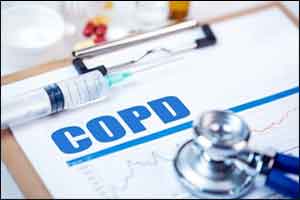- Home
- Editorial
- News
- Practice Guidelines
- Anesthesiology Guidelines
- Cancer Guidelines
- Cardiac Sciences Guidelines
- Critical Care Guidelines
- Dentistry Guidelines
- Dermatology Guidelines
- Diabetes and Endo Guidelines
- Diagnostics Guidelines
- ENT Guidelines
- Featured Practice Guidelines
- Gastroenterology Guidelines
- Geriatrics Guidelines
- Medicine Guidelines
- Nephrology Guidelines
- Neurosciences Guidelines
- Obs and Gynae Guidelines
- Ophthalmology Guidelines
- Orthopaedics Guidelines
- Paediatrics Guidelines
- Psychiatry Guidelines
- Pulmonology Guidelines
- Radiology Guidelines
- Surgery Guidelines
- Urology Guidelines
Beta blockers use does not improve COPD exacerbations: NEJM

USA: The use of beta-blockers in patients with moderate or severe chronic obstructive pulmonary disease (COPD) does not seem to reduce the risk of exacerbations and death, according to a recently published study in the New England Journal of Medicine.
The study found that among patients with moderate or severe COPD who did not have an established indication for beta-blocker use, the time until the first COPD exacerbation was similar in the metoprolol group and the placebo group. Also, hospitalization was more common among patients who were treated with metoprolol.
According to Mayo Clinic, COPD is a chronic inflammatory lung disease that causes obstructed airflow from the lungs. Symptoms include breathing difficulty, cough, mucus (sputum) production and wheezing. It's caused by long-term exposure to irritating gases or particulate matter, most often from cigarette smoke.
Most of COPD related mortality, morbidity, and health-care costs are driven by exacerbations, particularly those which lead to hospitalization. Many patients experience exacerbations despite maintenance therapy, there arises a need for new approaches to treatment.
Observational studies suggest that beta-blockers may reduce the risk of exacerbations and death in patients with moderate or severe chronic obstructive pulmonary disease (COPD), but these findings have not been confirmed in randomized trials. Mark T. Dransfield, the University of Alabama at Birmingham, Birmingham, AL, and colleagues conducted this prospective, randomized trial to confirm the same.
For the purpose, 532 patients between the ages of 40 and 85 years who had COPD were assigned to receive either beta-blocker (extended-release metoprolol) or placebo. All the patients had a clinical history of COPD, along with moderate airflow limitation and an increased risk of exacerbations, as evidenced by a history of exacerbations during the previous year or the prescribed use of supplemental oxygen.
Patients who were already taking a beta-blocker or who had an established indication for the use of such drugs were excluded.
The primary endpoint was the time until the first exacerbation of COPD during the treatment period, which ranged from 336 to 350 days, depending on the adjusted dose of metoprolol.
Key findings include:
- The mean forced expiratory volume in 1 second (FEV1) was 41.1±16.3% of the predicted value.
- The trial was stopped early because of futility with respect to the primary endpoint and safety concerns.
- There was no significant between-group difference in the median time until the first exacerbation, which was 202 days in the metoprolol group and 222 days in the placebo group.
- Metoprolol was associated with a higher risk of exacerbation leading to hospitalization (hazard ratio, 1.91).
- The frequency of side effects that were possibly related to metoprolol was similar in the two groups, as was the overall rate of nonrespiratory serious adverse events.
- During the treatment period, there were 11 deaths in the metoprolol group and 5 in the placebo group.
"Among patients with moderate or severe COPD who did not have an established indication for beta-blocker use, the time until the first COPD exacerbation was similar in the metoprolol group and the placebo group. Hospitalization for exacerbation was more common among the patients treated with metoprolol," concluded the authors.
More Information: "Metoprolol for the Prevention of Acute Exacerbations of COPD" published in NJEM.
DOI: 10.1056/NEJMoa1908142
Journal Information: New England Journal of Medicine

Disclaimer: This site is primarily intended for healthcare professionals. Any content/information on this website does not replace the advice of medical and/or health professionals and should not be construed as medical/diagnostic advice/endorsement or prescription. Use of this site is subject to our terms of use, privacy policy, advertisement policy. © 2020 Minerva Medical Treatment Pvt Ltd